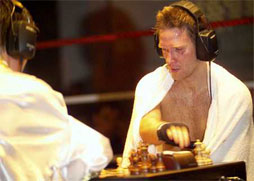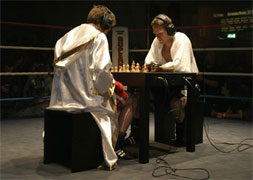|
|
||||||||
|
||||||||
Bashing the Bishop: People who do not like boxing dismiss it as just fighting: a semi-civilised version of a bar-room bust-up; a cruel and pointlessly violent spectacle that demeans boxers and spectators alike. They are wrong, of course, and probably vegetarian. Horse-racing is cruel because the endangered participants have no way of giving consent to take part. The same is true for gymnastics in China. Motor-racing demeans its spectators because it confirms just how tragic their own lives are, sitting palely inside their parents’ houses on a Sunday afternoon, watching a traffic procession in which the winner is the one with the most expensive car, and wistfully ogling the pit girls who are as unfairly unattainable to them as every other attractive woman in the world. ‘Fighting is always mindless whilst boxing is – to a large extent – mind games’ But we digress. Boxing is undoubtedly a hard, tough, brutal activity; it has its problems around the fringes with corruption. However, it can lay claim to be the only true sport: a distillation of the competitive ideal in which the best, the bravest, the most agile of body and brain will ultimately come first. That final characteristic is important: fighting is always mindless whilst boxing is – to a large extent – mind games. ‘Boxing is the realisation of tactical awareness under incredible pressure, which would serve as a perfectly adequate definition (or idealisation) of sport as a whole.’ This might surprise anyone who has ever heard Frank Bruno speak, but the true beauty of boxing is in the combination of mind and body, the one-two brain-brawn punch. Indeed, the physical pressure is such as to create a situation in which thinking at all becomes a challenge: how to stay cool amid the flurry of body punches, the exhaustion that is coursing like an accumulative poison through your system, the winging headshots you can scarcely see through an eye three-quarters closed like you are staring up at the sun. But clear thinking is precisely what will win the day: spotting that your opponent drops his right hand when he throws a jab; dropping your own right to make him think you’re doing the same, through tiredness; and then slipping his predicted shot to hammer home a hook into his achingly exposed ribs.
Boxing is the realisation of tactical awareness under incredible pressure, which would serve as a perfectly adequate definition (or idealisation) of sport as a whole. That makes it a bit like chess, you might blithely comment if you are fond – along with ITV commentators – of seemingly-incongruous sporting analogies. What you may not know is that our literal-minded continental cousins have actually taken the chess-boxing metaphor and made it real. The result is chessboxing, an unhyphenated hybrid of the two sports. ‘How about Snooker-Darts, surely a BBC2 scheduling dream?’ The rules – administered by the World Chess Boxing Organisation – are simple enough: eleven rounds; six of chess, five of boxing. The loser is checkmated, knocked out, or runs out of time on the chessboard. In the inaugural world title bout, Iepe ‘the Joker’ of Holland emerged victorious, when Germany’s Luis ‘the Lawyer’ ran out of time in the final chess round. So far, you might think, so Eurotrash. But there is, surely, some potential here: if boxing is already a killer combination of brain and brawn, thought and sport, it can perhaps be improved by the addition of the purely mental conflict of chess. The motto of chessboxing is ‘mens sana in corpore sano’ (which, as any punchy pugilist will tell you, is Latin for ‘healthy mind in a healthy body’) and its genius is in the sheer cruelty, the tortuously unhealthy exertions of mind and body that the contest must entail. Think also of the (tele)visual impact: two men, soaked in blood and sweat, crouched down – ponderously pensive – in front of one other, bruised hands no longer crashing into the other’s tired torso, but under civilised restraint manfully manoeuvring a tiny piece into a strengthening position. Or, if that seems to be rather more men’s sauna than mens sana, consider the possibility of a title-fight between the current grandees of the heavyweight scene, Lennox Lewis and Vitali Klitschko, both keen chess players, coming out of retirement to settle who is the truly the greatest competitor in the world. Better still, while we are waiting for that to happen, we can amuse ourselves by inventing new sporting hybrids. Sumo-Sudoku seems initially attractive: one fondly pictures the spectacle of two outsized Japanese men in nappies, staring fiercely at a tiny piece of paper with frustrated concentration, their tongues peeking ever so slightly out of their mouths. How about Snooker-Darts, surely a BBC2 scheduling dream? There is clear congruity here: the players would all embody the unathletic ideal of pasty-faced, pasty-eating ex-truants who have spent their youth in smoke-filled, gloomy bars; and both sports produce a tremendous exhibition of hand-eye co-ordination without any aerobic exertion.
But to return to chessboxing, and something of a reality check. It may seem like the ultimate inclusive sport, a level playing-field on which everyone can compete: the school bully against the computer geek. But that would never happen: the big lad – and rightly so – would still be able to defeat the skinny runt by an early knockout, before he can even get the chance to polish his glasses over his opening chess move. Think of the result if ‘the Joker’ or ‘the Lawyer’ came up against Bernard ‘the Executioner’ Hopkins or our own Nigel ‘Dark Destroyer’ Benn: they would immediately be knocked flat as the dreary Dutch landscape. What we should celebrate instead is that boxing can already be as tactically trying as chess, just as chess can be as murderously competitive as boxing. A well-made fight is a contest that requires no improvement; the boxing-chess metaphor should remain just that. As it stands, we should recognise that the physical-mental exertions of boxing make it the most essential sport in the world. Anyone who doesn’t agree needs to get back to home to their parents’ house: it’s probably past curfew and the motor-racing is about to start. Suggest the most ridiculous combination of sports and win an urban portrait in our Competition section, or three rounds with the writer. Click here |
|
|||||||
|
||||||||




